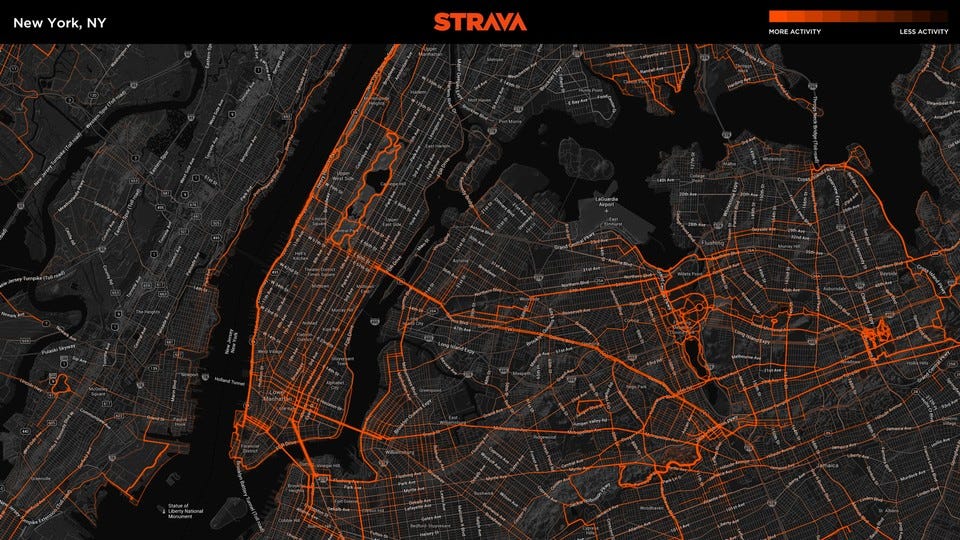Scientists Find 10,000 New Reasons to Hate Cars
This week, the world capital of moped sharing is revealed, a fitness app wants to plan cities, and a ride-hailing CEO says scooters suck as a business (yet offers them anyway), but first…

California, We’re Back
Big news.
Micromobility America is returning to Richmond, CA, on April 22 & 23, 2020. The two-day conference—our first—will bring together over a thousand entrepreneurs and disruptive thinkers for a program devoted to reinventing urban mobility. To learn more, visit our event webpage here.
A very limited number of Early Bird tickets are on sale now.
These all-access, two-day passes cost less than the opening price for any of our past, single-day events. We do not expect them to last long.
Grab your Early Bird tickets today before they run out.
We look forward to seeing you at the conference and taking the next step toward unbundling the car. If you have any questions, feel free to respond to this email.
Podcast: The Potential of Abundance
The latest episode of the pod is a major Horace Dediu/Oliver Bruce mind meld.
Looking (as always) to the smartphone and its impact on communications as a framework, Horace asks, what will happen to mobility when access is so abundant it’s practically free?
Listen here.
Video: Micromobility Executives Roundtable
Our featured video this week is the Micromobility Executives Roundtable, the largest-ever gathering of scooter leaders, from Berlin last month.
This high-level panel is a signature event featured at all our conferences. The Berlin edition featured CEOs, founders, and executives from six of the leading micromobility startups globally—Spin, Tier, Voi, Grow, Wind, Circ—in conversation with journalist-slash-lion-tamer Tim Bradshaw of the Financial Times. Watch as these entrepreneurs compare and contrast strategies for breaking through in a competitive market and reaching profitability.
Other new videos this week include presentations from executives at Jump by Uber, Segway-Ninebot, and Swiftmile. Check them out on our YouTube channel.
We will be releasing videos of presentations from our last conference all week. Follow us on LinkedIn and Twitter to get alerts when new ones are published.
What You Need to Know This Week
Leading off, a startling new report has linked air pollution nanoparticles produced by cars to brain cancer for the first time. “The new study, published in the journal Epidemiology, found that a one-year increase in pollution exposure of 10,000 nanoparticles per cubic centimetre—the approximate difference between quiet and busy city streets—increased the risk of brain cancer by more than 10%. The pollution levels in the cities studied—Toronto and Montreal—ranged from 6,000/cm3 to 97,000/cm3.” | Guardian
Lyft is pulling scooter service from six U.S. cities—San Antonio, Nashville, Atlanta, Phoenix, Dallas, and Columbus—and laying off part of its micromobility division. The ride-hailing company says it is going to focus on denser cities where the business model works better. | TechCrunch
Related: Last week we reported that Lyft was in the running to win a two-year scooter contract from the city of San Antonio. Now it appears likely that Bird will get a permit to operate instead. | Rivard Report
Many of China’s dockless bike-share providers, including Mobike and Hellobike, have been quietly nudging their prices up. | CX Tech
Boosted has released a set of larger, tougher urethane wheels for its electric skateboards that should allow for faster, smoother rides. The company also unveiled a new headlight/taillight combo. | The Verge

A global report by moped manufacturer Unu finds that the world capital of shared sit-down scooters is Bengaluru, with an estimated 15,000 vehicles available to rent. The southern Indian city is followed by Madrid and Paris in a distant tie for second, according to the researchers. | Unu
Montreal’s Bixi, the second-largest public bike-sharing system in North America, ended its 2019 season with a record 5.8 million rides, an increase of 8% over last year. | Global News
Self-driving garbage cans are in development at Google’s smart city project in Toronto, Quayside. | Mobile Syrup
Bird will ramp up its global operations in 2020 and make “continued pushes to selling our own products,” according to the company’s head of communications. | AdWeek
Related: Bird has applied for a patent for the remote control use of an on-demand electric vehicle. | Patent Images
Fitness app Strava is aggregating cycling and running data from its 72 million users into a software product for cities to use for planning bike lanes, sidewalks, and other infrastructure. | Curbed

Santa Monica has extended its scooter pilot program until May 2020. | Streetsblog
As Christmas nears, scooter sales in Australia are on the rise, despite the fact that the devices remain illegal to use on public roads in many places. A Lime spokesperson claims there may be over 150,000 personally owned scooters in the country already. | Guardian
Even as Amazon invests in electric vans and drones for delivery, some cities, like Vancouver and Montreal, are betting on electric cargo bikes as a faster, safer, more practical option. | CBC
Beryl is replacing Jump and Lime on Staten Island. The British bike-sharing startup has been granted a permit to deploy 1,000 dockless pedal bikes in the New York City borough starting next spring. This will be Beryl’s first system in the U.S. | Streetsblog
And in a reverse trans-Atlantic play, U.S. micromobility startup Wheels is deploying on-demand service in Stockholm, its first European city. The company is known for its distinctive LEV, which resembles a miniature ebike with pegs instead of pedals. | Breakit

A new study from Brigham Young University finds that riding an ebike requires almost the same amount of physical exertion as riding a conventional mountain bike. “Most importantly, the vast majority of the test subjects said they didn’t feel like they got a workout while riding an e-bike—despite heart rate monitors and fitness trackers indicating that most participants experienced ‘vigorous’ levels of exercise. This raises the possibility that e-bikes could be well suited in helping both experienced cyclists and ‘more sedentary individuals’ to meet their physical fitness goals.” | The Verge
Lime, Bird, and Wind have launched in Jerusalem as part of a scooter sharing pilot. | The Jerusalem Post
Minneapolis’s bike-share program Nice Ride, which is owned by Lyft, will officially replace its dockless pedal bike program with 2,000 station-based ebikes in 2020. | Star Tribune
Earlier this year, Middle Eastern ride-hailing company and Uber subsidiary Careem acquired the Abu Dhabi bike-sharing startup Cyacle. Now it has signed a 15-year deal (!) with Dubai to provide 3,500 bikes and 350 stations. The docking system will be from PBSC. | SME10X
Scooter and ebike sales in New Zealand have more than doubled since last October. | Oliver Bruce


IoT provider Taoglas has developed a GNSS positioning solution that it claims is accurate to within a centimeter. The new technology could have major implications for how dockless micromobility parking is governed in cities. | Everything RF
Fleet management solution Joyride has announced a new integration with autonomous repositioning startup Tortoise. | Joyride
To circumvent Japan’s tight restrictions on riding scooters on public roads, American startup Bolt Mobility plans to introduce on-demand scooter service on private property at 40 university campuses by the end of 2020. | Reuters
Meanwhile, Markus Villig, CEO of European Bolt, is very skeptical of scooter economics, even though his ride-hailing company offers shared rentals in 10 cities with more markets soon to be added. “We never need to actually make any profit on scooters. We more see them as a critical part of urban transport… Long term we will be upgrading it at cost because it’s an important service that needs to be there and it brings customers into our ecosystem. But it’s not a great standalone business.” | Sifted
Phew—we’ve got more bolts than Zeus this week. Australia’s Bolt Bikes, an ebike platform for delivery and courier businesses, raised $2.5 million in a seed round led by Maniv Mobility and Contrarian Ventures. The startup plans to bring its service to the U.S. and U.K. next. | Market Research Reporting
Stay Connected
Want more up-to-the-minute news and announcements? Be sure to subscribe to the newsletter and check out our website.


